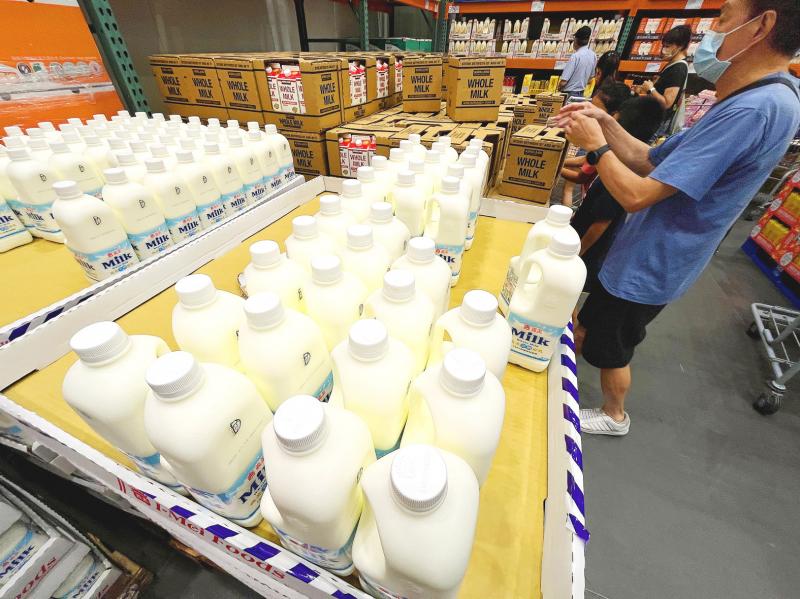Taiwan’s inflationary pressures could ease in the next two quarters as international crude oil, grain and raw material prices show signs of stabilization, while the government said it would offer tariff breaks for cement manufacturers, the National Development Council said yesterday.
The council cited the US Energy Information Administration as saying that Brent oil prices should decline 1.5 percent in the fourth quarter from an average price of US$106.56 a barrel in the first half of this year.
The projection, if realized, would mitigate inflationary pressures on most consumer items, as Taiwan relies heavily on imported oil to drive industrial activity.

Photo: CNA
The council made the statement a day after the Directorate-General of Budget, Accounting and Statistics said the consumer price index (CPI) rose by 3.59 percent year-on-year last month, marking its highest level in 14 years.
The council said international grain prices are expected to fall in light of excellent harvests in producer countries.
The government has extended tariff waivers on imported crops to help keep their prices stable, it said.
Additionally, international raw material prices have entered corrections, explaining why utilization rates of domestic steelmakers hover at about 70 percent, the council said.
Regardless, the government is to ease cost burdens for cement makers by cutting tariffs on their materials by 50 percent, it said.
The government also said it would crack down on inventory hoarding or price gouging to demonstrate its determination to stabilize consumer prices.
The Cabinet yesterday also said it was closely monitoring the cost of goods, but insisted Taiwan’s economic fundamentals remain strong, one day after the government reported that inflation had hit a 14-year high.
The rise in consumer prices was largely being driven by global factors, such as the war in Ukraine and uncertainty surrounding the COVID-19 pandemic, Executive Yuan spokesman Lo Ping-cheng (羅秉成) said at a news conference.
However, the fundamentals of the national economy remain strong, Lo said, citing stable growth in exports and private consumption, as well as investment being projected to reach 26.82 percent of GDP this year.
While the government prefers to allow market forces to dictate price adjustments, it is monitoring the situation closely and would not hesitate to act against price gouging, hoarding or profiteering, Lo said.
The Ministry of Economic Affairs also yesterday said that it would extend a range of financial relief measures for businesses in industrial technology parks, as well as some restaurants and private preschools until the end of the year.
Separately, Taiwan Academy of Banking and Finance chairman Wu Chung-shu (吳中書) yesterday said that while inflationary pressures could push the global economy into a brief recession, the worst could be over by next year.
Wu said he expects the recovery to happen even sooner in Taiwan, where inflation has been milder and mostly tied to imported goods, possibly allowing for a return to a sub-3 percent CPI by the fourth quarter of this year.

Power supply and electronic components maker Delta Electronics Inc (台達電) yesterday said second-quarter revenue is expected to surpass the first quarter, which rose 30 percent year-on-year to NT$118.92 billion (US$3.71 billion). Revenue this quarter is likely to grow, as US clients have front-loaded orders ahead of US President Donald Trump’s planned tariffs on Taiwanese goods, Delta chairman Ping Cheng (鄭平) said at an earnings conference in Taipei, referring to the 90-day pause in tariff implementation Trump announced on April 9. While situations in the third and fourth quarters remain unclear, “We will not halt our long-term deployments and do not plan to

‘SHORT TERM’: The local currency would likely remain strong in the near term, driven by anticipated US trade pressure, capital inflows and expectations of a US Fed rate cut The US dollar is expected to fall below NT$30 in the near term, as traders anticipate increased pressure from Washington for Taiwan to allow the New Taiwan dollar to appreciate, Cathay United Bank (國泰世華銀行) chief economist Lin Chi-chao (林啟超) said. Following a sharp drop in the greenback against the NT dollar on Friday, Lin told the Central News Agency that the local currency is likely to remain strong in the short term, driven in part by market psychology surrounding anticipated US policy pressure. On Friday, the US dollar fell NT$0.953, or 3.07 percent, closing at NT$31.064 — its lowest level since Jan.

The US dollar was trading at NT$29.7 at 10am today on the Taipei Foreign Exchange, as the New Taiwan dollar gained NT$1.364 from the previous close last week. The NT dollar continued to rise today, after surging 3.07 percent on Friday. After opening at NT$30.91, the NT dollar gained more than NT$1 in just 15 minutes, briefly passing the NT$30 mark. Before the US Department of the Treasury's semi-annual currency report came out, expectations that the NT dollar would keep rising were already building. The NT dollar on Friday closed at NT$31.064, up by NT$0.953 — a 3.07 percent single-day gain. Today,

The New Taiwan dollar and Taiwanese stocks surged on signs that trade tensions between the world’s top two economies might start easing and as US tech earnings boosted the outlook of the nation’s semiconductor exports. The NT dollar strengthened as much as 3.8 percent versus the US dollar to 30.815, the biggest intraday gain since January 2011, closing at NT$31.064. The benchmark TAIEX jumped 2.73 percent to outperform the region’s equity gauges. Outlook for global trade improved after China said it is assessing possible trade talks with the US, providing a boost for the nation’s currency and shares. As the NT dollar